Some projects supported by Operation Hope
This section presents different projects supported by the Operation Hope solidarity fund on different continents.
To send a donation to Operation Hope, you can find details here.
Bangladesh | Supporting students
Cambodia | A place for the sick
From 2008 until 2020, Operation Espérance supported a hospital for the sick created by the parish of the Infant Jesus in Boeng Tumpun, Cambodia. To meet the needs of poor villagers from the different provinces of the country, the parish launched this project which promotes the dignity of the sick and provides them with the necessary care. Proximity to the capital, Phnom Penh, facilitates access to hospitals if necessary. The donations make it possible to contribute to the costs of hospitalization and also to finance the center itself, the remuneration of the staff, the maintenance of the premises, hospitality expenses, and medication.
See:
2015 Cambodia
Europe | Assistance to refugees
From the beginning, the Taizé Community has always been attentive to refugees. During the Second World War, Brother Roger had hidden a number of them in his house at Taizé. Later on families were welcomed, from places like Vietnam, Laos, Bosnia and Rwanda. In recent years, the community has welcomed families from Iraq and Syria, as well as groups of young migrants from Calais.
In 2016, young asylum-seekers from Sudan, South Sudan, Eritrea, Syria and Afghanistan stayed in Taizé. This welcome was made possible thanks to the collaboration of many volunteers from the region and financial support from Operation Hope. The community seeks to help these young people become self-reliant once they have been granted refugee status.
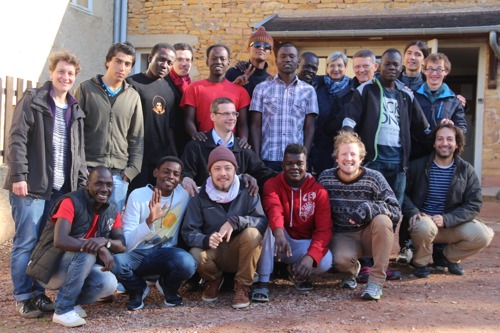
Operation Hope also supports initiatives to assist refugees, led by associations working in the region around Taizé.
Laos | A sewing workshop
Burkina Faso | Participation in several projects
Burkina Faso is situated in the Sahel where the dry season lasts nine months without interruption. The population uses open wells that often dry up and the women are forced to use unhealthy water collected in artificial ponds during the rainy season. Sometimes they have to go as far as ten kilometres in order to find water and the rare wells that do exist become a source of conflict because of the scarcity of water and the long time they have to wait. Operation Hope supports the drilling of wells and the installation of pumps. These wells are an essential source of water supply for the people and for the prevention of sickness.
In 2010, Operation Hope also supported a project to provide milk for children at the hospital of Nanoro, also in Burkina-Faso.
In 2021, Operation Hope supported a project to create an agro-pastoral farm in Koubri (breeding pigs and laying hens) as well as an agricultural production field (papayas, citrus fruits and potatoes). This project aims to act on several levels: combating poverty, promoting modern agricultural and livestock techniques, creating jobs for young people and ensuring food self-sufficiency. The project is led by three young agricultural engineers, Father Noël (from the Saint Vincent de Paul religious order in West Africa), with the support of the mayor of Koubri.
Middle East | Different initiatives
Operation Hope has recently supported several initiatives in this region:
![]() The crises facing Lebanon, including economic decline, Covid-19, and the impact of the devastating explosion in Beirut on 4 August 2020, have brought stress and trauma to children. The closure of schools due to Covid-19 and the damage caused by the blast have resulted in a sharp decline in the quality of education. In Beirut, through the Adyan Foundation (a Lebanese organisation founded by Christian and Muslim members), Operation Hope helped to support children with disabilities whose homes, schools and education had been badly affected by the blast. The abrupt shift to online school learning meant that these children needed tools to access online education. The "Blessed School", which usually caters for children with disabilities, was severely damaged by the Beirut explosion. The children of this school were happy to receive a wonderful personal gift for Christmas, and the school was able to purchase teaching materials suitable for online education and thus enable the children to continue their studies to the full.
The crises facing Lebanon, including economic decline, Covid-19, and the impact of the devastating explosion in Beirut on 4 August 2020, have brought stress and trauma to children. The closure of schools due to Covid-19 and the damage caused by the blast have resulted in a sharp decline in the quality of education. In Beirut, through the Adyan Foundation (a Lebanese organisation founded by Christian and Muslim members), Operation Hope helped to support children with disabilities whose homes, schools and education had been badly affected by the blast. The abrupt shift to online school learning meant that these children needed tools to access online education. The "Blessed School", which usually caters for children with disabilities, was severely damaged by the Beirut explosion. The children of this school were happy to receive a wonderful personal gift for Christmas, and the school was able to purchase teaching materials suitable for online education and thus enable the children to continue their studies to the full.
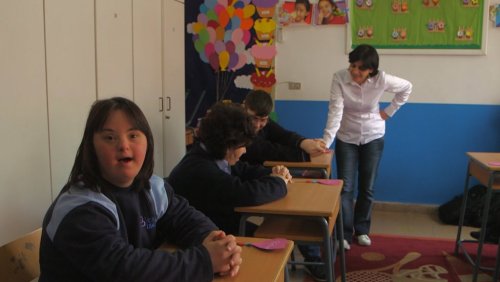
![]() In Syria, in Aleppo, the Franciscan community distributes food parcels and emergency aid to displaced persons. It also works to set up drinking water networks and to distribute fuel oil for generators and heating. This community also assists people with their health needs, taking care of part of the costs. Finally, the brothers ensure the education of children and young people, trying to offer spaces for activities and studies.
In Syria, in Aleppo, the Franciscan community distributes food parcels and emergency aid to displaced persons. It also works to set up drinking water networks and to distribute fuel oil for generators and heating. This community also assists people with their health needs, taking care of part of the costs. Finally, the brothers ensure the education of children and young people, trying to offer spaces for activities and studies.
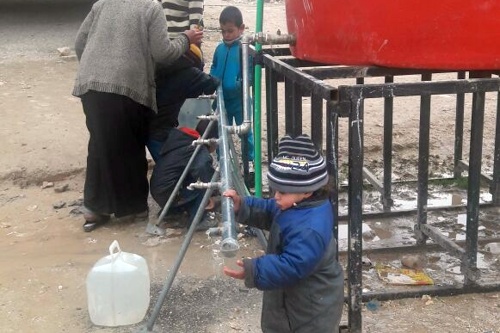
![]() In Iraq, at Erbil, aid is given to the Syriac Orthodox Jacobite community, from which one of the Iraqi families settled at Taizé comes. When the Christian villages on the Nineveh plain were liberated by the Iraqi army, the Christians found that their churches had been devastated by ISIS. The money collected is used to support those displaced in Erbil who cannot return to the destroyed villages and to the cleaning and reconstruction of places of worship.
In Iraq, at Erbil, aid is given to the Syriac Orthodox Jacobite community, from which one of the Iraqi families settled at Taizé comes. When the Christian villages on the Nineveh plain were liberated by the Iraqi army, the Christians found that their churches had been devastated by ISIS. The money collected is used to support those displaced in Erbil who cannot return to the destroyed villages and to the cleaning and reconstruction of places of worship.
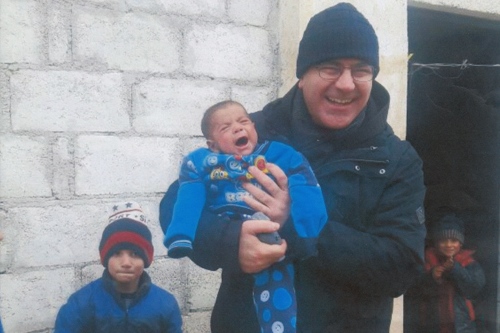
Holidays for Ukrainian children
Thanks to Operation Hope, during the summers of 2015 and 2016 a group of children from eastern Ukraine was welcomed in Taizé for a few weeks. Their families fled the Donbass at war and have since been living in Kiev. For these children, aged 7 to 14 years, the time spent in Taizé was a moment of joy and peace after the difficult months of the war. Their joyful presence on the hill also helped to express solidarity with those who suffer from war at the gates of Europe.
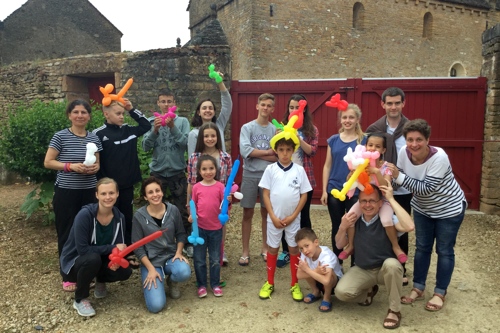
Congo | Support for an eye clinic
Dr. Richard Hardi has been living and working in the Democratic Republic of Congo for twenty years as an ophthalmologist. He is a committed member of the Community of the Beatitudes. He practices in Mbuji Mayi, the capital of East Kasai province, but he makes regular medical missions in remote areas.
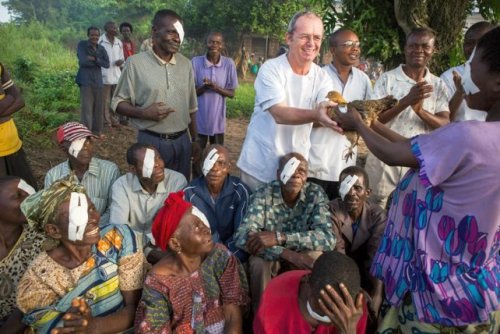
In much of the country, he is virtually the only ophthalmologist who operates on children and difficult cases. He performs over 2,500 operations each year.
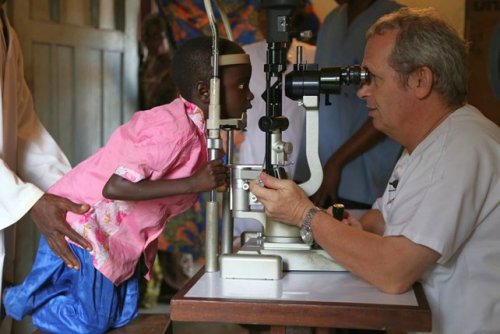
Since 2015, Operation Hope supports the construction of an eye clinic undertaken by Dr. Hardi for which the region has a great need.
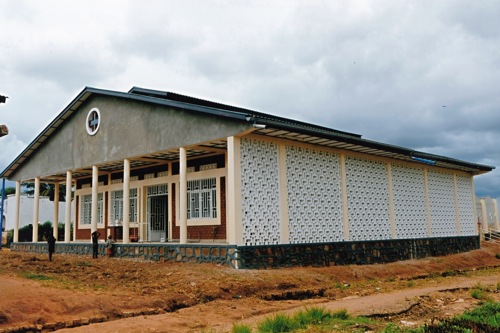
North Korea | Humanitarian aid
In 2016, the Community invited two doctors from the Hospital of the Red Cross of North Korea to do a refresher course in France. These doctors spent three months in Paris and the costs of their stay were borne entirely by Operation Hope. Between 2007 and 2011, six other doctors had also done a one-year internship in France.
The first humanitarian deliveries to this country were made in 1998 and 1999. More than one thousand tons of maize flour were sent for the population who were suffering after several years of drought and flooding.
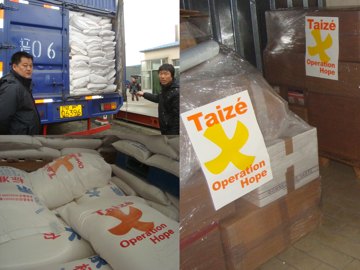
Since then, every year it has been possible to make a gesture of solidarity. Milk and feeding bottles for newborn babies, medical equipment and basic medication, were collected during the European meeting in Berlin at the end of 2011. Dozens of packs of medication, hundreds of stethoscopes, thermometers, bandages, gauze, syringes and different medical supplies as well as several large boxes of surgical devices and two sterilisers were sent. Operation Hope added two new oxygen concentrators. This support continued the following years with the sending of medical devices and medication. The North Korean Red Cross takes care of the distribution to hospitals and rural clinics.
A brother of the Community, originally from South Korea, has visited North Korea several times. He has sometimes accompanied the delivery of foodstuffs.
China | One million Bibles printed
At the European meeting which brought together 40,000 young people in Brussels at the end of 2008, Brother Alois announced that, to respond to the needs of the Christians of China, the Taizé Community was going to have printed one million Bibles in China—200,000 complete Bibles and 800,000 New Testaments with Psalms. The printing was done in Nanjing, and from there the books were delivered across the country in successive stages throughout 2009.
In 2009, the Taizé Community is also supporting the biblical work of the Protestant Church in China. This support was continued throughout 2010 and 2011.
South Sudan | After the civil war
In a village 25 km. south of Rumbek, some fifty families of lepers live; they have come from the entire Great Lakes region. Although medical treatment heals the disease and removes all danger of contagion, the loss of limbs sometimes remains a great handicap. The social stigma continues to affect them. The lepers cannot stay in their place of origin. Their children, even if they themselves have not been touched by the disease, are not welcome in school. The courage and hope of these families who have started a new life from scratch in great isolation and precariousness are remarkable. Operation Hope is helping build a building for the primary classes, so that the children can continue to study even during the rainy season.
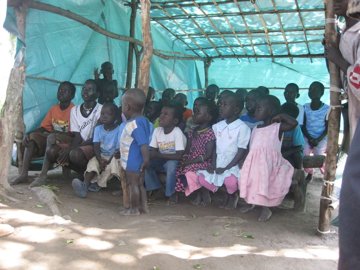
The civil war, the fees demanded and the lack of schools have kept many young people from continuing their schooling; helping them to develop their full potential is a priority. Setting up the Youth Opportunity Center wants to give a strong signal in favor of this commitment. On land occupied by the resources of an NGO during the civil war, the Church wants to develop a place of welcome, activities and formation open to young people of all backgrounds. Operation Hope is contributing to building a multipurpose room to replace the leaking tent.
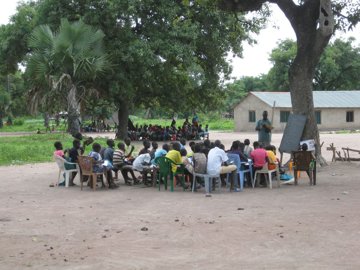
See also:
In South Sudan, summer 2013
Greece | An initiative for French-speaking migrants on Lesbos
Togo | Bethany House in Lomé
«Maison Béthanie» is a non-profit humanitarian association set up in 2000 by Sister Victoire, a Togolese member of the Resurrection of Lazarus of Bethany fraternity in Togo, and who was affected by the poverty and abandonment of children in Lomé.
The home takes in orphaned, destitute and/or abandoned children. They receive comprehensive care in terms of food, health, schooling and the beginnings of a vocational training.
Today, 62 destitute children benefit from the support of Maison Béthanie: 39 children live on site in the Maison itself; the others still live with their families and need financial and nutritional support. The children who have come of age cannot stay at Bethany House for the time being. This is why some of them receive financial support for accommodation, but often also for food and finance. To help these young people find a job, one of the projects is to support their vocational training, by extending the reception area, creating studios, a restaurant, a sewing and batik workshop, a hairdressing salon, etc. In this way, the skills of each individual will be developed.
The objectives of Maison Béthanie are to promote and protect children’s rights, to provide them with a suitable environment, to ensure their schooling and to offer them psycho-social support, so that they can integrate into an independent adult life in the long term.
Colombia | A Home for Children
In the town of Caldas, just south of Medellín, a local association, the Fundación Ramón-Carolina, supports young girls who, for various reasons, cannot live with their families. They stay together during the week and see their parents for a short visit every weekend. There are currently around thirty girls divided into two separate groups. They are cared for by a very complete team: three nuns who live with them, plus a cook, a child psychologist and a teacher, as well as volunteers who come for various activities. Three local people who have been sent to Taizé by the diocese as young volunteers over the last twenty years are among those working or volunteering with the association.
Operation Hope has supported the work needed to move to new premises in 2023 that will enable the home to welcome more children.
Haïti | A Cooking School
Buvette is a small town a few kilometres from Jérémie, the capital of the Grande-Anse department. Farming is the main activity here, and the land is very fertile. However, many young people remain unemployed after completing their schooling, or are forced to go elsewhere if they want to practise a trade. Some end up begging, and some girls become pregnant at an early age.
Against this backdrop, the AJDEB association (Association des Jeunes pour le Développement de Buvette) is working for the recovery of the region and is proposing activities capable of restoring the confidence of young people.
With the help of Opération Espérance, AJDEB has been able to buy equipment and utensils to start a cookery and pastry-making course in January 2023. This school, attended by 30 people, mainly young mothers, is the first step towards setting up a vocational training centre, the aim of which is both to help make better use of local produce and to prepare young people in technical and manual skills.
Cuba | Projets linked with the brothers in Cuba
In October 2014, Brother Alois went to Cuba, with some brothers, on a stage of the “pilgrimage of trust” to the Caribbean. Prayers were held in Havana and Matanzas. Since 2016, around ten brothers of the community have spent varying lengths of time in the country, enabling them to get to know the situation of the people and the Churches better.
With the pandemic, the economy has collapsed and through multiple trips it has been possible to bring to Cuba medicines that are lacking, reading glasses, children’s shoes and activity equipment for young people. In 2023, Opération Espérance also supported Alcoholics Anonymous groups by helping to run a regional office.
Operation Hope has also made it possible for half a dozen Cubans to visit Taizé for a few weeks. The possibility of Cubans coming into contact with people from other countries, outside the framework of tourism, is so limited that such visits are important.
Democratic Republic of the Congo | Starting cooperatives in rural communities
«What do you grow in your field? What are the biggest problems you face and how do you solve them? What have you achieved that you are proud of?» These are some of the questions asked at meetings in the villages of the Lubumbashi region. As well as providing pastoral care, the catechists in the church communities are also involved in setting up and managing cooperatives. The aim is to empower local farmers by providing them with technical support and access to financial resources.
The cooperative model helps people to overcome the obstacles to integral development. Faith in Christ deepens the sense of solidarity and the common good. The influence of cooperatives extends far beyond agricultural production. Thanks to them, direct links between producers and consumers are established and exchanges between small towns and their surrounding rural areas are strengthened. They help to create jobs for young people.
Burundi | School relocation project
In February 2025, through Opération Espérance, the Taizé Community made a donation to the Saint Louis de Gonzague school on the outskirts of Bujumbura, to support the school’s relocation project. This urgency arose after heavy rains destroyed eight of its eighteen classrooms in 2024, and it was discovered that the entire hill on which the school is built is not stable; it continues gradually collapsing.
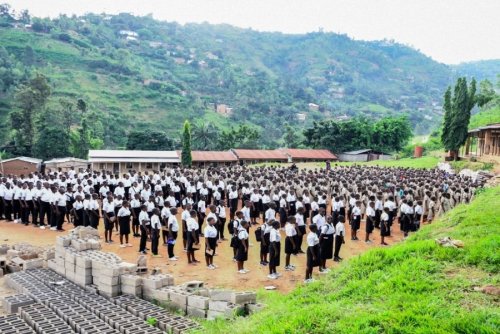
Africa | Four projects supported in 2023/24
South Sudan
In 2023, the community supported a traveling camp organized by the diocese of Rumbek for young adults as well as a nutritional project for mothers and children.
Chad
Following the stay at Taizé of Father Bruno Koularambaye, youth chaplain of the Archdiocese of N’Djamena, the community contributed in 2024 to the construction of a multipurpose hall in the village of Ngouri.
Democratic Republic of Congo
In 2023, the community provided one-off assistance to the parish of Sainte Marie Auxilliatrice in Kasomeno / Diocese of Kilwa-Kasenga for the organization of training for village agricultural cooperative leaders (management and accounting, new agricultural techniques, training for women, etc.)

Kenya
In February 2024, a brother from the community visited the Little Sisters of the Poor at Kasarani in Nairobi - in recent years, Operation Hope had supported their care of isolated and resourceless elderly people.
Between 2010 and 2017, the Taizé community in Nairobi collaborated with TUSA: a community organization that welcomes and supports refugee families from the Great Lakes region - Burundi, Congo and Rwanda - as part of the training of young refugees. In 2022 and 2023, the community provided support for emergency shelter and schooling for children from refugee families. TUSA is organized into supportive communities in neighborhoods.
 TAIZÉ
TAIZÉ